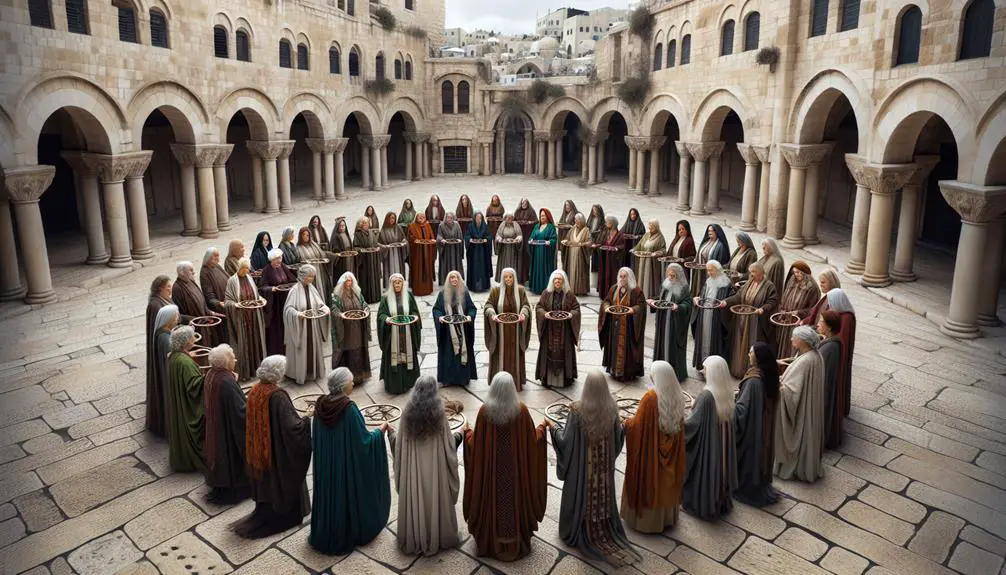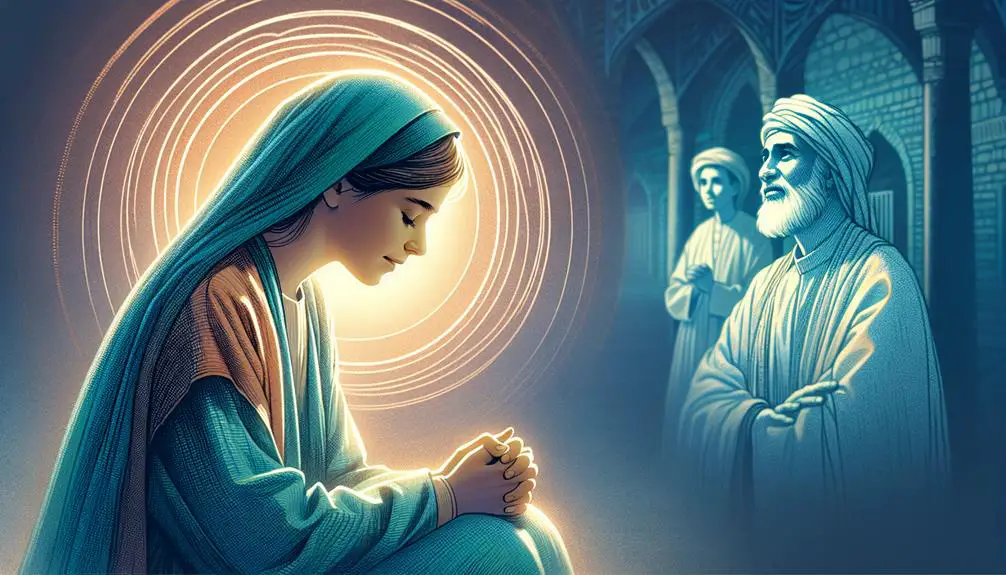Navigate the untold stories of the Bible's female elders, where courage and wisdom defy the expectations of their time.

Female Elders in the Bible
Behind every great man, there's often an overlooked woman, and this sentiment rings especially true when you consider the female elders of the Bible. You've likely heard of Miriam, Deborah, Ruth, Hannah, and Esther, but have you truly understood their roles as leaders, warriors, and strategists in a time when such titles were rarely afforded to women?
Their stories are not just footnotes in history; they are central chapters that shaped the course of events. By exploring their lives, you're not just uncovering ancient tales; you're uncovering lessons in courage, wisdom, and resilience that are remarkably relevant today.
Curiosity piqued? There's much more to these women than meets the eye.
Key Takeaways
- The Bible highlights women like Deborah and Miriam in leadership, setting precedents for female eldership roles.
- Stories of Esther and Ruth show the impact of strategic leadership and loyalty in challenging cultural norms.
- Female biblical figures utilized wisdom, diplomacy, and collective mobilization to lead effectively.
- The narratives underscore the importance of balancing inner virtues with leadership qualities in female eldership.
Miriam: Prophet and Leader

Miriam, recognized as a prophet and leader, played a pivotal role in the biblical narrative of the Exodus. Her story, deeply woven into the fabric of the Israelites' journey from Egypt to the Promised Land, exemplifies the power of faith and the importance of women in religious narratives. Notably, Miriam's musical leadership and the symbolism of water are central themes that highlight her significance.
You'll find that Miriam's musical leadership comes to the fore after the Israelites' successful crossing of the Red Sea. She leads the women in song and dance, a celebration of their deliverance from Pharaoh's clutches. This act of worship not only underscores her role as a spiritual leader but also illustrates the power of music as a form of praise and communal bonding. Through this, Miriam's leadership transcends verbal prophecy, engaging the community in a deeply emotional and unifying experience.
Moreover, water symbolism permeates Miriam's narrative, further elevating her importance. Initially, she's introduced at the Nile River, watching over her brother Moses. Later, the 'Waters of Miriam' provide sustenance for the Israelites in the desert. These instances aren't mere coincidences but rather, they underscore her life-giving role and protective nature. Water, essential for physical life, becomes a metaphor for spiritual nourishment and guidance, qualities embodied by Miriam's presence and actions.
In analyzing Miriam's story, it's clear that her contributions are pivotal. Her musical leadership and the profound water symbolism attached to her legacy reflect a multifaceted leadership style that combines spiritual guidance, communal care, and emotional intelligence.
Deborah: Judge and Warrior

Deborah stands as a formidable figure in the biblical narrative, exemplifying the roles of both judge and warrior with unparalleled prowess. Her story, chronicled in the Book of Judges, chapters 4 and 5, reveals her as a pivotal character in Israel's history, embodying the essence of tribal leadership and military strategy. Unlike other leaders of her time, Deborah's influence extended beyond judicial authority; she was a catalyst for military action, directly engaging in the mobilization of tribes against the Canaanite oppression.
Analyzing Deborah's role, you can't overlook her unique position as a female leader in a predominantly patriarchal society. Her leadership style was both consultative and directive, illustrating a balance between wisdom and action. This duality is most evident in her relationship with Barak, to whom she delivers the divine command to lead Israel's army. Deborah's involvement didn't stop at the issuance of orders; she was present on the battlefield, a rarity for leaders of her time, further emphasizing her warrior aspect.
The song of victory attributed to Deborah and Barak, as recorded in Judges 5, provides a poetic account of the battle and her role in it. This song isn't only a celebration of triumph but also a testament to the collaborative tribal leadership that marked this period of Israelite history. It underscores the significance of Deborah's leadership and her contribution to the narrative of Israel's deliverance.
In essence, Deborah's story is a compelling account of a woman's ability to lead, fight, and inspire. Her legacy as a judge and warrior endures, offering a nuanced perspective on leadership and gender roles in ancient texts.
Ruth: Loyalty and Devotion

Ruth's narrative, a testament to unwavering loyalty and devotion, showcases her role as a paradigm of these virtues within the biblical context. Her story, deeply embedded in the fabric of religious and cultural discussions, serves as an exemplary model of unwavering faith and the challenge of cultural norms.
To unravel the complexity of Ruth's character and her significant contributions, consider the following aspects:
- Unwavering Loyalty: Ruth's decision to stay with Naomi, her mother-in-law, after the death of her husband, defies the expected return to her native land and gods. This choice underlines her steadfast loyalty, not only to Naomi but also to a new faith and people.
- Challenge to Cultural Norms: Ruth's actions break from the traditional roles assigned to women in her time. Her initiative in gleaning the fields for sustenance and her approach to Boaz for marriage protection illustrate a proactive stance against societal expectations.
- Manifestation of Faith: Ruth's journey from a foreign land to Bethlehem symbolizes a physical and spiritual journey into a new faith community. Her integration and acceptance into this community underscore her unwavering faith in God's provision.
- Legacy of Devotion: The culmination of Ruth's story in the lineage of King David and, by extension, the messianic line, highlights the profound impact of her loyalty and devotion. It underscores the principle that faithfulness, regardless of one's background, is highly esteemed.
Through these lenses, Ruth's narrative not only enriches the biblical tapestry but also offers timeless lessons on loyalty, faith, and the subversion of cultural norms.
Hannah: Prayer and Promise

While Ruth's narrative demonstrates the power of loyalty and devotion, Hannah's story in the Bible exemplifies the profound impact of prayer and the significance of promises made to God. Hannah's account, particularly her childlessness struggle, serves as a testament to the enduring power of persistent faith. Unlike other narratives, Hannah's tale delves deep into the anguish and societal pressures associated with being unable to bear children, showcasing her vulnerability and desperation.
Hannah's journey is characterized by her unwavering faith and determination. She doesn't succumb to despair but instead turns to prayer as her solace and means of communication with God. Her prayers aren't casual requests but are marked by a deep sense of sincerity and desperation. It's her persistent faith that sets the stage for the divine intervention in her life.
Moreover, Hannah's promise to God—that if He were to grant her a son, she'd dedicate him to the Lord's service—highlights the reciprocal nature of her faith. It isn't just about asking for blessings but also about committing oneself to fulfill vows made to God. This aspect of her story underscores the significance of promises in one's spiritual journey. When her prayers are answered, and she gives birth to Samuel, Hannah's fulfillment of her vow by dedicating Samuel to the temple service exemplifies her integrity and faithfulness.
Hannah's story offers profound insights into the power of prayer, the pain of childlessness, and the importance of keeping promises to God. Her persistent faith amidst adversity serves as an enduring lesson on the significance of trust and commitment in one's spiritual life.
Esther: Courage and Strategy

In the biblical narrative, Esther exemplifies unparalleled courage and astute strategy, navigating complex power dynamics to save her people from extermination. Her story, rich with political acumen and royal beauty, becomes a paradigm of effective leadership under dire circumstances. Esther's journey from a Jewish orphan to the Queen of Persia showcases not just her external beauty but her inner strength and wisdom.
- Royal Beauty as a Tool: Esther's physical appearance initially places her in a position of influence, allowing her access to the Persian king. However, it's her wisdom and character that ultimately win the king's favor and trust, proving that while her beauty opens doors, her intellect and courage dictate the outcomes.
- Strategic Timing: Recognizing the importance of timing, Esther waits for the perfect moment to reveal her Jewish identity and Haman's plot against her people. Her patience and strategic timing underscore her political acumen, as she ensures the king's receptivity and maximizes the impact of her revelation.
- Leveraging Influence: Esther cleverly uses her position to orchestrate a series of banquets, subtly weaving her request into the fabric of royal diplomacy. This approach demonstrates her understanding of the power dynamics at play and her ability to navigate them with grace and tact.
- Collective Mobilization: She also calls upon her people to fast and pray, mobilizing them in a collective act of faith and solidarity. This not only prepares her spiritually but unites her people, showcasing her leadership and the power of communal support in facing adversity.
Esther's story illuminates the power of courage, strategy, and the wise use of one's position, affirming her as a model of leadership and resilience.
Frequently Asked Questions
How Did the Cultural Context of Ancient Times Influence the Roles and Recognition of Female Elders in the Bible?
The cultural context of ancient times, deeply influenced by archaeological evidence and cultural artifacts, significantly impacted roles and recognition in historical texts.
You'll find that societal norms and expectations, preserved through artifacts, shaped the visibility and acknowledgment of individuals in these records.
This backdrop is crucial for understanding how certain figures are depicted or mentioned, as it reflects the broader cultural and historical framework shaping their roles and recognition in any narrative.
Are There Any Lost or Apocryphal Texts That Provide More Insights Into the Lives and Roles of Female Elders Not Commonly Discussed in the Mainstream Bible?
Yes, there are apocryphal texts that offer fresh perspectives on figures not widely recognized in the mainstream Bible.
These documents, varying in authenticity, provide a broader scope for textual discovery, enriching our understanding of historical contexts and roles.
Scholars analyze these texts to uncover insights into lesser-known individuals, examining their impact and significance.
This exploration contributes to a more inclusive historical and religious narrative, offering depth to traditional interpretations.
How Have Interpretations of the Roles of These Female Elders Evolved Within Different Branches of Christianity and Judaism Over the Centuries?
You've noticed that interpretations of specific roles have shifted across various Christian and Jewish denominations over centuries. Artistic depictions and liturgical roles, especially, reflect these changes, showing a dynamic understanding and appreciation of these figures' contributions.
Scholars and theologians have debated their significance, leading to evolving practices in worship and representation. This evolution underscores the fluid nature of religious interpretation and the impact of cultural and historical contexts on religious roles.
In What Ways Have Modern Feminist Theologians Reinterpreted the Stories of These Female Elders to Reflect Contemporary Understandings of Gender and Leadership?
Ever wondered how contemporary perspectives shape our understanding of leadership and gender dynamics?
Modern feminist theologians have dug deep, reinterpreting stories to mirror today's views on gender and leadership. They've challenged traditional narratives, highlighting the strength and wisdom of leaders through a lens that values equality and diversity.
This fresh approach not only questions historical interpretations but also paves the way for more inclusive models of leadership. Isn't that a thought-provoking shift?
How Do the Contributions of These Female Elders Compare to Those of Male Counterparts in the Bible in Terms of Influence on Religious Teachings and Practices?
When comparing contributions in terms of influence on religious teachings and practices, it's important to note differences in leadership styles and spiritual authority. Often, you'll find that male figures are more frequently highlighted, but this doesn't diminish the impact of their female counterparts.
Their leadership, though sometimes less visible, has been pivotal in shaping spiritual narratives and practices, challenging traditional views on gender roles within religious contexts.
Conclusion
In examining these formidable women from the Bible—Miriam, Deborah, Ruth, Hannah, and Esther—you've ventured through a tapestry of divine wisdom and human resilience that has shaped faith and morality across millennia.
Their stories, embroidered with prophetic insight, judicial prowess, unwavering loyalty, fervent prayer, and strategic courage, aren't just ancient texts but living testimonies to the monumental impact of female leadership.
Indeed, their legacies are as boundless as the stars, guiding generations in the quest for spiritual and ethical enlightenment.



Sign up